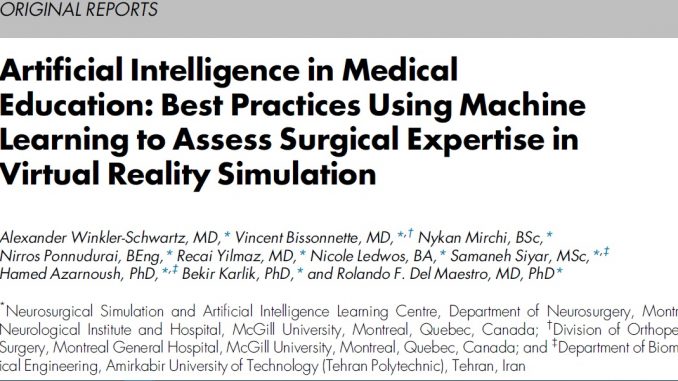
ABSTRACT
Objective
Virtual reality simulators track all movements and forces of simulated instruments, generating enormous datasets which can be further analyzed with machine learning algorithms. These advancements may increase the understanding, assessment and training of psychomotor performance. Consequently, the application of machine learning techniques to evaluate performance on virtual reality simulators has led to an increase in the volume and complexity of publications which bridge the fields of computer science, medicine, and education. Although all disciplines stand to gain from research in this field, important differences in reporting exist, limiting interdisciplinary communication and knowledge transfer. Thus, our objective was to develop a checklist to provide a general framework when reporting or analyzing studies involving virtual reality surgical simulation and machine learning algorithms. By including a total score as well as clear subsections of the checklist, authors and reviewers can both easily assess the overall quality and specific deficiencies of a manuscript.
Design
The Machine Learning to Assess Surgical Expertise (MLASE) checklist was developed to help computer science, medicine, and education researchers ensure quality when producing and reviewing virtual reality manuscripts involving machine learning to assess surgical expertise.
Setting
This study was carried out at the McGill Neurosurgical Simulation and Artificial Intelligence Learning Centre.
Participants
The authors applied the checklist to 12 articles using machine learning to assess surgical expertise in virtual reality simulation, obtained through a systematic literature review.
Results
Important differences in reporting were found between medical and computer science journals. The medical journals proved stronger in discussion quality and weaker in areas related to study design. The opposite trends were observed in computer science journals.
Conclusions
This checklist will aid in narrowing the knowledge divide between computer science, medicine, and education: helping facilitate the burgeoning field of machine learning assisted surgical education.
Key Words
simulation surgery education artificial intelligence assessment machine learning
Competencies
Medical KnowledgeInterpersonal and Communication SkillsPatient Care and Procedural Skills
